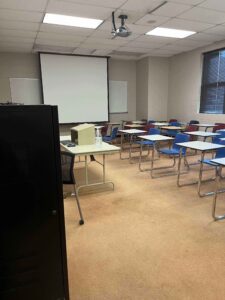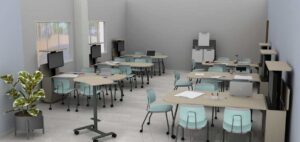Millsaps College is proud to announce that it has been awarded a $400,000 grant from the National Science Foundation to conduct pioneering research aimed at revolutionizing STEM education. This significant funding underscores Millsaps’ leadership in exploring innovative teaching methods and its commitment to enhancing student learning experiences.
The project, led by Dr. Beth Hussa, chair of the biology department; Dr. Stacy DeZutter, professor of education and psychology; and Dr. Cory Toyota, associate professor of organic chemistry, is set to transform traditional classroom environments into spaces that foster active learning and greater student engagement. Titled “Active Learning Sociocultural Progression through Adapted Classroom Environments,” the study will investigate how classroom design influences the way students and faculty approach the learning process.
Cutting-Edge Research on Active Learning

Olin Hall, Room 204, as it is today.
Active learning, an educational approach where students actively participate in their learning process rather than passively receiving information, has been shown to significantly improve student success in STEM fields. However, there is still much to learn about the best ways to implement and scale this approach effectively. Millsaps College’s research will focus on how the physical layout of a classroom—specifically a Technology-Enhanced Active Learning classroom—can facilitate this shift.
“Our goal is to create a learning environment that prioritizes student engagement and fosters a deeper understanding of STEM subjects,” said Dr. DeZutter. “This NSF grant is a giant vote of confidence in the validity of our research, which has the potential to impact not just our institution but educational practices nationwide.”
A New Model for Learning
The research will compare traditional classroom setups, where students face a centralized instructor, to TEAL classrooms, which feature flexible space and furniture with updated technology that encourages group work and collaboration. In these TEAL classrooms, instructors move from being the sole source of knowledge to facilitators of a more dynamic and interactive learning experience.
“We’ve seen evidence that TEAL classrooms allow students to learn better and enable teachers to teach more effectively,” explained Dr. Hussa. “Millsaps is unique in that we begin using active learning techniques from Day 1, not just in upper-level or graduate classes. This new research will help us understand and refine these practices even further.”
Impact Beyond Millsaps

Rendering of new classroom style.
“Our instructors are among the best, consistently integrating active learning into their teaching,” said Toyota. “The new classroom setup, coupled with the research it will generate, will help us refine our approach and influence educational practices across the country.”
The NSF-funded project will not only benefit Millsaps students but also contribute to broader educational research. The study will involve qualitative methods, including interviews with students and faculty before and after the implementation of the TEAL classroom. This research will explore how these spaces can support all students, particularly those from underrepresented groups, including first-generation college students and those with disabilities.
“Active learning pedagogy is ideal for students who might typically be marginalized in traditional learning environments,” noted Dr. DeZutter. “By focusing on each student’s strengths and weaknesses, we can provide personalized support that helps every student succeed.”
Looking Forward
This three-year project, set to begin in May 2025, will also see Millsaps students directly involved in the research process, offering them hands-on experience in cutting-edge educational methods. The findings from this study are expected to guide future classroom designs and teaching practices, with Millsaps College leading the way in shaping the future of STEM education.
“This research is extremely important for the future of learning, and we are excited that Millsaps students will reap the benefits of this work,” added Dr. Hussa.
